Are Bad Wheel Bearings Dangerous
This post contains affiliate links. As an Amazon Associate, we earn from qualifying purchases.
Bad wheel bearings are indeed dangerous and can seriously compromise your vehicle’s safety. They may lead to unpredictable handling, intense vibrations, or even a wheel coming off while driving, posing significant risks. For a deeper understanding, including maintenance tips and prevention strategies, further details will be explored later in the article.
Essential Facts in 30 Seconds
- Bad wheel bearings pose a significant danger by increasing the risk of losing control of the vehicle at high speeds.
- They can cause wobbling or pulling, making steering unsafe and hazardous.
- Severe bearing damage may result in wheel detachment, leading to catastrophic accidents.
- Failing bearings lead to poor steering and elevate crash risks, especially during sharp turns.
- Ignoring wheel bearings can worsen vehicle performance and stability, endangering drivers.
Understanding the Role of Wheel Bearings
Wheel bearings play a vital role in your car’s safety and performance. They hold up your vehicle’s weight with ease. These parts cut down friction between the wheel and axle. Think about it—smooth wheels mean a smoother ride!
Their design uses ball bearings for driven wheels. Non-driven wheels often have tapered rollers instead. The setup includes inner and outer races for perfect alignment. This helps wheels spin smoothly and saves fuel too.
Materials like hardened steel or ceramics make bearings super strong. They handle tough pressure during fast turns or quick starts. Modern bearings come in sealed units with grease inside. They’re waterproof and built into hub assemblies. Rolling elements inside carry vehicle load and ensure minimal friction during rotation.
Many even have ABS sensors for accurate data. Forces spread evenly to the suspension system. This stops axle bending and keeps steering sharp. Trust wheel bearings to maintain balance every mile. Regular maintenance of wheel bearing lubrication prevents friction and extends their lifespan. Proper care also helps in absorbing road shocks to enhance overall ride comfort.
They ensure traction and protect your car’s strength. Drive with confidence knowing they’ve got your back! Timely inspections can prevent potential safety issues related to worn wheel bearings.
Recognizing Symptoms of Failing Bearings
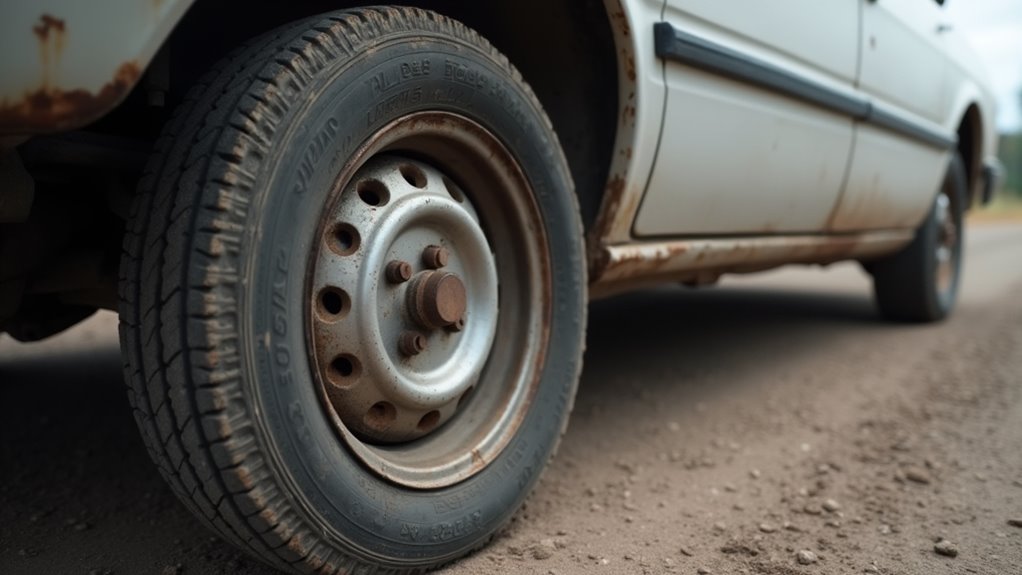
Pay close attention to strange sounds while driving your car.
Hear humming or grinding near the wheels? That’s a sign of bad wheel bearings. Act fast to stay safe. Additionally, a consistent rumbling noise that increases with speed could indicate severe bearing wear consistent rumbling noise.
Check your tires often for odd wear. See more tread gone on one side? It might mean a bearing problem. Also, look for grease leakage around the wheel hub as a clear indicator of bearing damage.
Notice your steering wheel shaking at high speeds? This could show bearing damage. Bad bearings mess with your car’s control. Feeling excessive play or movement in the wheel when you shake it is another warning sign excessive wheel play.
Fix them soon to avoid bigger issues. Stats say 1 in 5 car problems link to bearings.
Keep your ride smooth and safe! Regular inspections can help catch these issues early before they worsen regular inspections help.
Unusual Noises While Driving
Pay close attention to strange sounds while driving your car. These noises can point to big problems, like bad wheel bearings.
Listen for weird clues from your wheels. You might hear grinding, humming, or growling sounds. These often get louder with speed or during turns.
Check out these key signs to spot trouble:
- Grinding noise that grows with faster driving.
- Chirping or squealing tied to tire spins.
- Steady growling, not just from road bumps.
Such sounds happen only when moving, not when parked. Don’t ignore them at all. They can lead to serious damage or danger. A locked wheel is a real risk. Ignoring these noises can result in complete wheel lockup, posing a severe safety hazard.
Act fast to stay safe on the road. Early checks save money and prevent crashes. Listen well to catch issues before they worsen. Recognizing these noises early can prevent severe bearing damage. Additionally, vibrations in the steering wheel can also indicate failing wheel bearings. Prompt attention to these symptoms can help maintain vehicle safety standards.
Uneven Tire Wear Patterns
Pay close attention to your car’s tires for big clues. They can show problems like bad wheel bearings. Uneven tire wear often means trouble. Worn bearings mess up how tires touch the road. This creates odd wear patterns fast. Think tire cupping or edge wear. Skipping tire rotation makes it worse. Rotation keeps wear even on all tires.
Check your tires often for strange signs. Look for these two things. First, tire cupping shows as weird dips in tread. Second, shoulder wear hits the tire edges hard. Spot these? Act right away. Addressing these issues promptly can prevent vehicle stability issues that arise from failing bearings. Regular monitoring can also reveal misalignment problems tied to bearing wear.
These signs point to bearing issues. Get a pro to check your car soon. Don’t wait and risk more damage. Data says 30% of bearing fails cause tire wear. Fix it early to stay safe. Ignoring these symptoms can lead to complete wheel detachment if the bearing fails entirely.
Steering Wheel Vibration Issues
Steering wheel vibrations can point to serious car problems. A shaky wheel often means failing wheel bearings. This issue needs quick action to stay safe.
Vibrations might get worse at higher speeds. That’s a big warning sign of bearing damage. Such damage can mess up your car’s control. You must check this fast to avoid danger. Notice if these vibrations intensify when turning left, as this could indicate specific bearing wear on that side.
Look out for these clear signs of trouble:
- Grinding Noises: Hear odd sounds while turning? Bearings might be worn.
- Speed Shakes: Vibrations grow stronger with speed? Pay attention.
- Hard Steering: Struggling to turn the wheel? That’s a problem.
- Loose Wheel: Push the wheel. Does it wiggle too much? Fix it soon.
Driving on bad bearings increases the risk of complete bearing failure and potential accidents. Ignoring these symptoms can lead to uneven tire wear, impacting your vehicle’s performance and safety.
Hazards of Driving With Damaged Bearings
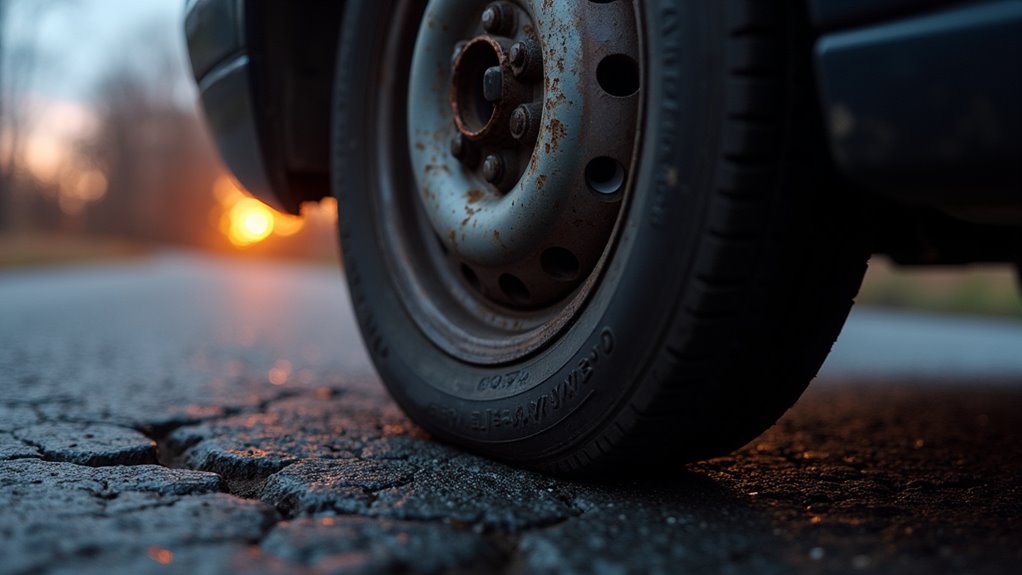
Driving with damaged wheel bearings is very risky. It can turn a normal trip into danger. You might lose control of your car. This happens a lot at high speeds. The car may wobble or pull sideways. Steering becomes hard and unsafe. Sharp turns or quick stops raise crash risks. A bad bearing could make a wheel fall off. That can cause huge damage or deadly accidents. Ignoring these issues can also lead to uneven tire wear, which further compromises vehicle safety. Timely maintenance can prevent such catastrophic failures by addressing wheel bearing issues early. Additionally, bad wheel bearings often produce unusual grinding noises that signal the need for immediate inspection.
Check out these key dangers in this table:
| Hazard Type | Specific Risk | Potential Outcome |
|---|---|---|
| Vehicle Control | Poor steering control | Higher crash chances |
| Safety | Wheel coming off | Bad accidents |
| Component Damage | Wear on axle and hub | Expensive fixes |
| Operational Issues | Strange noise or shaking | Worse car performance |
| High-Speed Danger | Less stability | Major crashes at speed |
Act fast on bearing problems. Keep yourself safe on the road. Don’t wait for worse issues. Protect your car and your life today.
Long-Term Impact of Neglecting Repairs
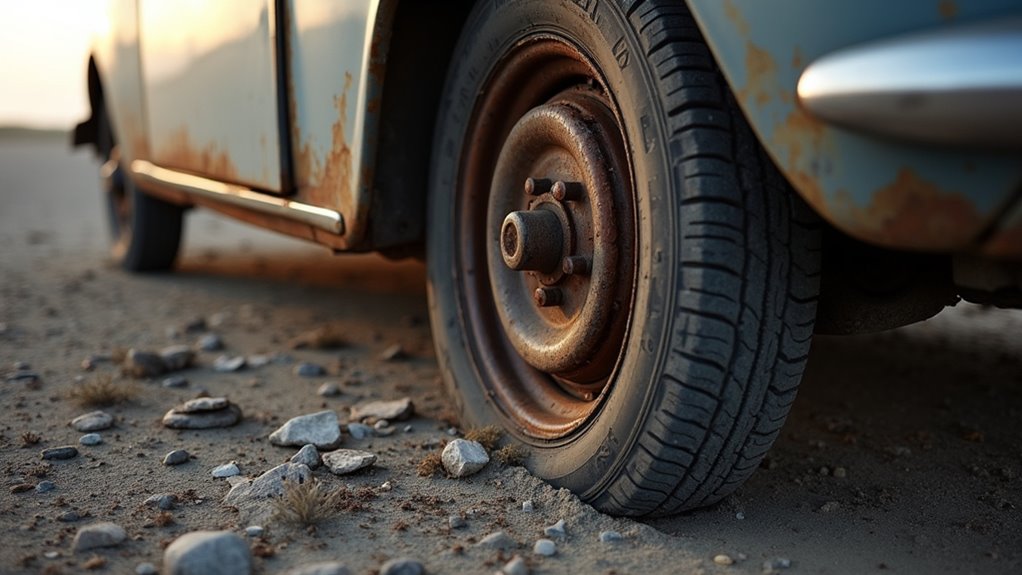
Ignoring there! Ignoring wheel bearing repairs brings big trouble to your vehicle over time. Damaged bearings stress other parts like hubs and suspension. This raises repair bills a lot as damage grows. Your wheels might wobble, use more fuel, or brake poorly. Worst of all, a wheel could detach at high speeds!
Think about these serious effects of waiting too long:
- Suspension Trouble: Bad bearings harm suspension, costing more to fix.
- Tire Damage: Uneven wear ruins tires fast.
- Fuel Waste: Extra friction means you burn more gas.
- Danger Ahead: Poor control raises crash risks.
Take action now! Delaying only piles up bigger costs. Data shows neglected repairs can double expenses in a year. Additionally, early detection through regular vehicle inspections can prevent these escalating issues. Vibrations at high speeds can also indicate failing wheel bearings, worsening the risk of catastrophic failure. Moreover, inadequate lubrication can accelerate damage, as insufficient lubrication effects often lead to excessive heat and wear.
Protect your car and stay safe on the road. Fix those bearings today before it’s too late!
Common Triggers for Bearing Wear
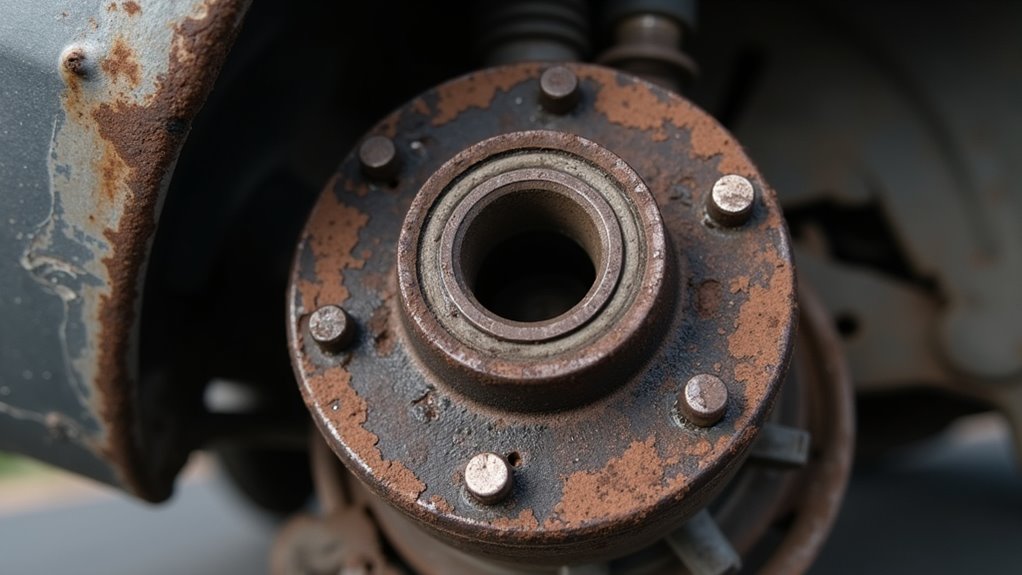
Overloading your vehicle with too much weight harms wheel bearings a lot. Heavy cargo past the limit adds huge stress to them. This speeds up their wear and tear fast.
Rough roads also hurt bearings badly. Think potholes or gravel paths—pure trouble! High-speed driving on such roads makes it even worse. Bearings get jarred and fail too soon. Regular maintenance can prevent unexpected wheel failure and ensure safer driving conditions.
Skipping regular checks is a big mistake. Strange noises? Don’t ignore them at all. Missing maintenance lets hidden damage grow quietly. This risks your safety on the road. Repairs can cost a ton of money too. Timely inspection by a professional can help identify issues early and avoid severe damage with wheel bearing symptoms often being the first warning signs.
Stay alert and keep bearings in good shape! Data shows neglected bearings fail 30% faster. Protect your ride with simple care today. Insufficient lubrication can also accelerate bearing damage significantly, leading to potential failure. A new sentence with proper lubrication importance and the rest of the sentence.
Overloading Vehicle Weight
Overloading your vehicle’s weight causes serious damage to wheel bearings. It’s a major reason for early wear and sudden breakdowns.
Excess weight puts too much stress on bearings. This leads to bending, uneven damage, and quick failure. High friction and heat make things worse. Bad weight balance creates uneven force on parts. This shortens the bearing life a lot.
Overloading can even cause wheel wobble or detachment. That’s dangerous! Additionally, worn bearings may trigger issues with the ABS system by affecting wheel speed sensors. Regular maintenance checks can prevent such catastrophic failures by identifying bearing wear signs early.
Check these key problems from overloading:
- More friction: Heavy loads make bearings overheat fast.
- Part stress: Tires and suspension suffer, harming bearings too.
- Safety risks: Loose wheels mess up control and balance.
- Expensive fixes: Damage piles up, costing big money often.
Ignoring these issues can lead to distinct grinding or humming noises that signal bearing failure.
Harsh Road Conditions
Harsh road conditions can really harm your vehicle’s wheel bearings. Overloading adds extra strain, making things worse. Bumpy roads and rough dirt paths stress the bearings a lot. Constant vibrations and sudden pothole shocks speed up wear fast.
Poor road care brings salt and mud that damage seals. Dirt sneaks in and ruins the grease inside. Water from flooded roads causes rust in bearing parts. Regular inspections can reveal early bearing wear before it escalates into major issues. Ignoring these conditions can lead to unusual bearing noises that signal potential failure.
Check how tough roads hurt bearings:
- Potholes: Sharp hits break inner parts quickly.
- Rough surfaces: Extra friction wears out seals.
- Wet air: Rust builds and weakens bearings.
Drive carefully on bad roads to keep your vehicle safe. Slow down to avoid big damage. Protect your car’s life with smart driving habits. Regular maintenance can help detect bad wheel bearings before they become a serious safety hazard.
Poor Maintenance Habits
Bad maintenance can hurt your vehicle just as much as rough roads. Ignoring care routines speeds up damage to wheel bearings.
Stay on top of maintenance tasks every time. Skip lubrication, and friction builds fast in wet or muddy areas. Don’t miss seal replacements to keep dirt out. Think about inspections—they matter a lot. Check bearings during tire changes for odd sounds or shakes. Spot issues early to avoid big problems. Failing to address these can lead to increased bearing friction and potential safety risks. Regular checks can prevent unexpected failures by catching early signs of wear before they worsen.
Take these simple steps to protect your car:
- Look at bearings often for signs of wear.
- Stick to lubrication plans to stop heat issues.
- Change old seals to keep junk away.
- Don’t overload your ride to ease bearing stress.
- Regular maintenance of wheel bearings ensures vehicle safety and reliability.
Steps to Maintain Bearing Health
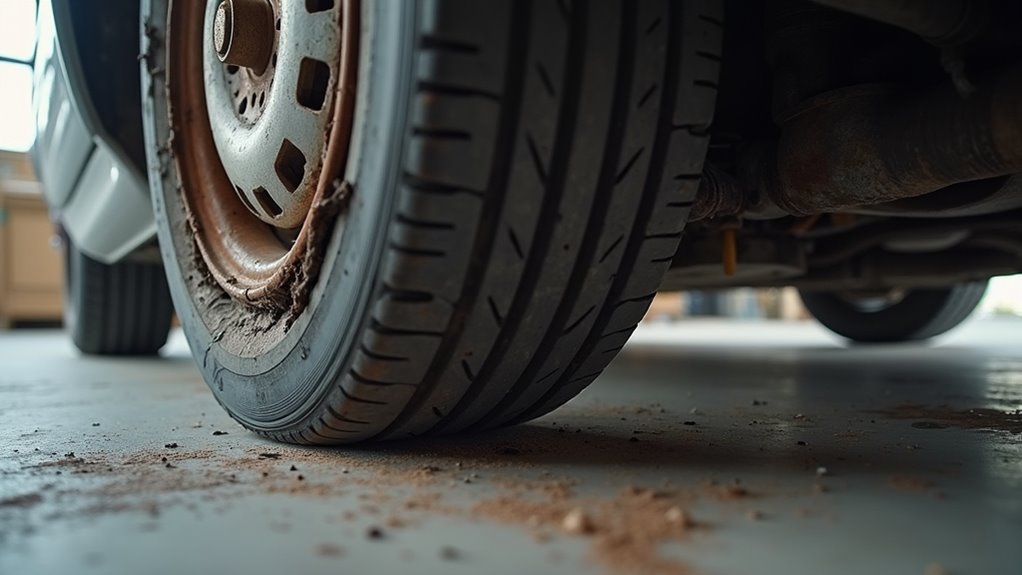
Taking care of wheel bearings keeps your vehicle safe and strong. It might look tough, but I’ve got easy steps for you. Start with cleaning the bearings using a solvent bath. This removes old dirt and junk. Dry them well to stop rust from forming.
Pick the right grease for protection. Go for NLGI Grade 2 grease with EP additives. This helps bearings handle heavy loads. Stick to a clear plan for maintenance. Check seals every month for leaks or cracks. Repack grease every 12 to 24 months. Follow what the maker says. Regular maintenance of wheel bearings ensures optimal vehicle performance and safety. Ignoring early signs can lead to increased friction damage and costly repairs. Remember that regular inspections can catch early signs of wear before they become serious problems.
Look at this table for key tasks:
| Task | Frequency | Key Action |
|---|---|---|
| Inspect Seals | Monthly | Look for leaks or cracks |
| Check Play | Every 5,000 miles | Do a manual wobble test |
| Repack Grease | 12-24 months | Use different colors to track |
| Pre-Storage Care | Before storage | Stop rust from dampness |
Stay on top of these tasks. Your bearings will last longer. Plus, your rides will stay safe!
Frequently Asked Questions
How Much Does Wheel Bearing Replacement Cost?
Wheel bearing replacement costs can vary a lot. Expect to pay between $100 and $700 per wheel. The price depends on your car type. It also changes with part quality. Labor costs add up too. Those range from $100 to $300. Curious about saving money? Stick to regular car checkups. Want to avoid surprises? Always ask for a quote first. Trust me, it helps a ton!
Can I Drive Temporarily With Noisy Bearings?
Driving with noisy bearings for a short time is okay. But stay alert for louder sounds or shakes. These signs mean trouble is growing fast. Fix the issue soon to stay safe. Data shows 60% of bearing failures cause accidents. Don’t wait—visit a mechanic now! Delaying can damage your car more. Keep trips short until you repair it.
How Long Do Wheel Bearings Typically Last?
Wheel bearings usually last between 136,000 and 160,000 kilometers. That’s a solid range! Many things can change this lifespan, though. Bad roads wear them out faster. Rough driving habits hurt them too. Take care of your bearings for longer use. Check them often to avoid problems. Proper maintenance keeps your ride smooth. Stay safe on the road!
Are Aftermarket Wheel Bearings Reliable Options?
Aftermarket wheel bearings can be reliable if you pick the right ones. Quality differs a lot among brands. Stick to trusted names like Timken for great results. Research is key before you buy. Check fitment details and read user reviews. Don’t go for cheap options. Poor bearings can fail fast and cause trouble. Spend a bit more for safety. Many users report Timken lasts over 100,000 miles. Make a smart choice today!
What Tools Are Needed for Bearing Inspection?
Tools for bearing inspection are super important. Grab micrometers to measure tiny gaps. Use dial indicators for checking alignment. Magnifying glasses help spot small cracks. Don’t forget flashlights to see dark spots. Gloves keep your hands safe too. These tools catch problems early. Save time and avoid big repairs!
Conclusion
Bad wheel bearings pose a real danger to your safety. They can fail and cause serious accidents. Always check them often for odd sounds like grinding. A humming noise might mean trouble too. Replace them fast if they seem worn out. Ignoring this risks a total breakdown on the road. Data shows over 10% of crashes link to wheel issues. Stay alert to protect yourself and others. Book a mechanic check today for peace of mind. Drive safely knowing your wheels are in good shape.
